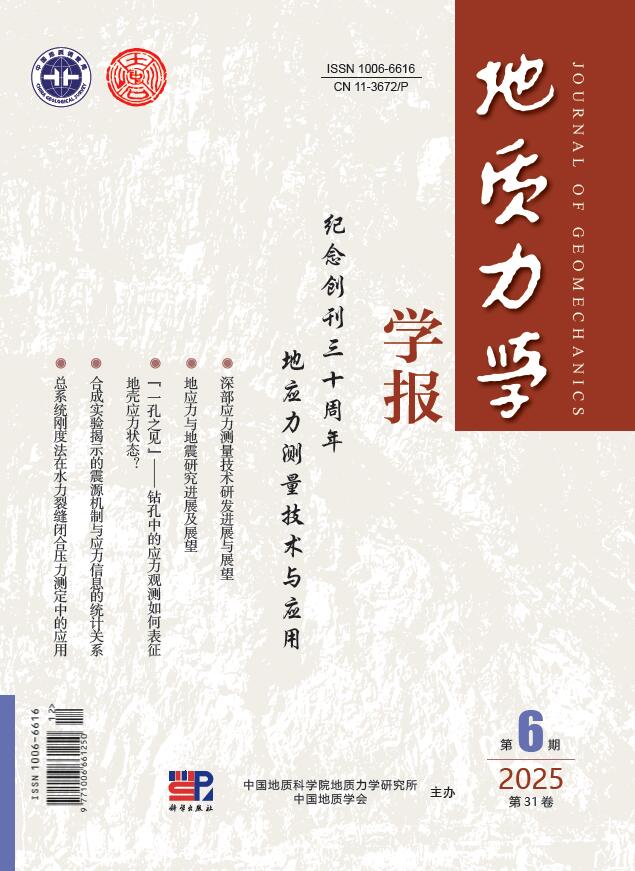Journal of Geomechanics follows the recognized publication ethics.According to the relevant guidelines published by the Committee on Publishing Ethics (COPE) and combined with the actual situation of the journal, we have formulated the ethical standards for the publication of Journal of Geomechanics:
Duties of Authors
1. Manuscripts should meet the requirements indicated on the page of “Submission Guideline”. Authors should confirm the sources of all data they used, and the findings and results from other researchers mentioned in the manuscript should be properly cited and marked. Authors should ensure that the manuscript is an original work, free from academic misconduct (e.g., plagiarism, data forgery), contains no confidential information, and does not involve multiple submissions, redundant publication and other relevant issues.
2. Authorship Criteria:
All signed authors must meet the journal's authorship criteria, that is, all authors must have materially participated in the research and/or article preparation. They should have made substantial contributions to the following: conception and design of the study, acquisition of data, analysis and interpretation of data, drafting the article or revising it critically for important intellectual content, or final approval of the version to be submitted, etc.
3. Author Contribution Statement:
In order to prevent academic misconduct like nominal authors, all authors need to fill in and upload the "Author Contribution Statement Form" provided by the journal during submission to declare their individual contributions to the article.
4. The author list shall not be modified at will. Any addition, deletion, or rearrangement of author names in the authorship list should be made before the manuscript has been accepted. To request such a change, the corresponding author should explain the reason for the change, and send the confirmation letter that all authors agree to modify the author list to the Editorial Office. When adding or removing authors, the confirmation letter should also include the acknowledgments of the added or removed authors.
5. Conflict of Interest Statement:
During submission, all authors need to fill in and upload the journal's “Conflict of Interest Statement Form” to disclose all potential conflicts of interest involved in the research. A conflict of interest may exist when an author (or the author’s institution or employer) has financial or personal relationships or affiliations that could influence (or bias) the author’s decisions, work, or manuscript. Authors should also disclose conflicts of interest with products that compete with those mentioned in their manuscript.
6. Authors should state the funding information related to the research in the manuscript, but not other funding information unrelated to the research.
Duties of Editors
1. Editors should deal with each manuscript fairly and impartially, and accept or reject a manuscript according to the journal's scope, the novelty and academic quality of the manuscript. For manuscripts that pass the preliminary review, editors should register and submit them for the following review processes; and for the manuscripts that pass the final review, editors should edit and publish them in a timely manner.
2. Editors should follow double-blind review process and keep the true review records. They have the duty to keep confidential the information of authors and reviewers, the authors' research results, and the intermediate materials in manuscript processing.
3. Editors have the responsibility to avoid academic misconduct such as multiple submissions and redundant publication. Editors should review a manuscript twice after submission and before publication.
4. Editors should provide authors with detailed revision opinions or reasons for rejection as much as possible, objectively state the review status of manuscripts, and do not make personal comments or attacks on review experts and authors.
5. In the process of editing and publishing, editors should not only pay attention to publishing norms, but also respect author's point of view and writing style, and should obtain author's consent for key revisions of a manuscript, such as revision to academic views.
Duties of Reviewers
1. Reviewers should make honest, objective, and fair review based on the principles of maintaining academic integrity and respecting academic freedom; they shall not prejudice or discriminate against author's country, institution, race, religion, political belief, gender, etc., and shall not disclose the research content of manuscripts that they review.
2. When there are conflicts of interest between reviewer and author (e.g., kinship, teacher-student relationship, alumni relationship, colleague relationship, competition relationship), in order to ensure the fairness of the review, the reviewer should consult the Editorial Office in time to obtain further suggestions.
3. When a reviewer finds the research is similar to his/her own, the review comments must not contain unsubstantiated or malicious criticism and unfair content. The reviewer should avoid making unfounded allegations.
4. Reviewers should review manuscripts in a timely manner as agreed. If reviews cannot be returned on time, the reviewer should notify the Editorial Office in time and withdraw from reviewing the manuscript, and can recommend suitable reviewers. Without the permission of the Editorial Office, reviewers are not allowed to entrust their own students or colleagues to review the manuscripts on their own behalf.
5. When reviewers encounter a manuscript they have reviewed, they are obliged to report the situation to the Editorial Office and complete the review according to the journal’s standards.
Academic Misconduct
Journal of Geomechanics only accepts original articles that have not been submitted to other journals and have not been published. Academic misconduct such as plagiarism, data forgery, multiple submissions, and redundant publication are strictly prohibited!
In order to prevent academic misconduct, the Editorial Office adopts the AMLC System provided by China national knowledge infrastructure (CNKI) and the Literature Similarity Detection System provided by Wanfang Data to check the manuscripts during the preliminary review stage and before their publication.
Manuscripts involving academic misconduct will be rejected by the journal. If a manuscript is found to involve academic misconduct after publication, the journal will retract the manuscript, notify the authors’ institutions and other relevant journals, and hold the authors responsible in accordance with relevant law and regulations, and the "Copyright Transfer Agreement" signed by the authors. For manuscripts with severe academic misconduct (e.g., intentional multiple submissions), the journal will no longer accept the authors’ submission. In addition, authors who are found to have academic misconduct behavior will be included in the “List of Academic Misconduct Authors” of the journal, and for the authors in this list, the Editorial Office will focus on reviewing the content of their research results, and may restrict the publication of their manuscripts.
Appeal, Retraction and Correction
1. Journal of Geomechanics accepts authors’ appeals:
If authors have any disagreement about the review comments or review results, they could submit a written complaint to the Editorial Office by sending it to the journal’s email (dzlx@vip.163.com). The author who submits the appeal needs to make detailed explanation for each review comment. After receiving the appeal, the Editorial Office will investigate and deal with it as soon as possible, and the result of the appeal will be fed back to the author.
2. Editors will consider retracting manuscripts under the following circumstances:
If a manuscript which has been accepted by the journal is found to involve academic misconduct, the Editorial Office has the right to retract the manuscript and inform the authors’ institutions and other journals of the situation.
If an article which has been published by the journal is confirmed to involve plagiarized research results, falsified data, redundant publication, betraying confidential matters or other issues, the Editorial Office will retract the article, including publishing a retraction statement publicly, informing the authors and their institutions, and requiring relevant databases to delete all online versions of the article so that the adverse effects of the misleading article could be minimized.
In addition, if an article which has been accepted or published by the journal is found to have severe scientific errors, which makes the results and conclusions of the article unreliable, the Editorial Office will retract the article, including publishing a retraction statement publicly and requiring relevant databases to delete the online versions of the article.
3. Editors will consider correcting manuscripts under the following circumstances:
If parts of an article turn out to be scientifically incorrect but would not materially affect the results and conclusions (especially due to honest errors), or the author list of an article is incorrect (i.e., competent authors were ignored or those unqualified were listed as authors), the Editorial Office will consider to publish a corrected version of the article.
Digital Archive &Online Accessibility
Articles published by the journal since its establishment in 1995 have been digitally archived on the journal’s official website, through which readers can directly access the articles online. All information and material are backed-up in the Editorial Office for security reason, including the print-copy and digital-copy of all issues, and all other relevant material (e.g., authors’additional information and forms submitted during submission).
In addition to archiving on our official website, the full-text of the journal’s articles is also stored in the following databases and platforms: CNKI, Wanfang Data, Chongqing VIP Journal Database, Superstar Journals Database, Aidubao Database of China Post, and Bookan platform. Readers can access the above-mentioned databases and platforms to obtain the articles published by Journal of Geomechanics.
It is allowed for authors to deposit all versions of their articles in an institutional or other repository of the authors’ choice. However, it is necessary to indicate the articles’publishing information in the metadata in the institutional or other repository and use that as a recommended way of citation.







